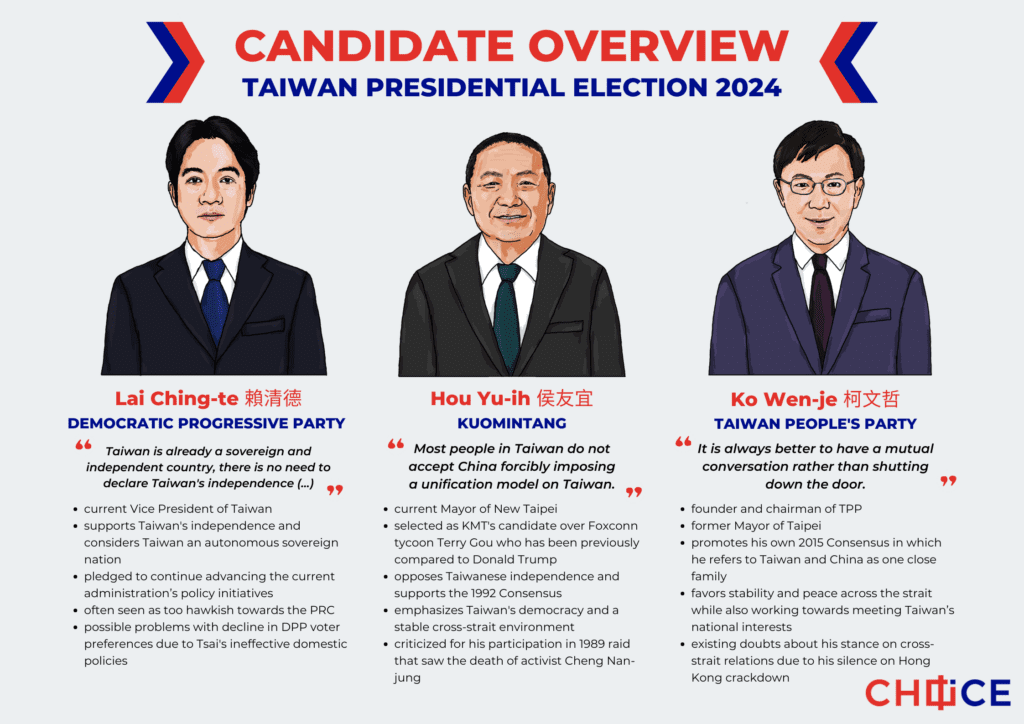Taiwan’s 2024 Presidential Elections and the Future of Cross-Strait Relations

With ties across the strait more unpredictable than ever, Taiwan braces itself for the upcoming presidential elections that will take place in January 2024.
This article is part of a series of articles authored by young, aspiring China scholars under the Future CHOICE initiative.
Taiwanese voters will be able to cast their ballots in favor of a candidate from one of Taiwan’s three political parties taking part in the elections: the Democratic Progressive Party (DPP), Kuomintang (KMT), and Taiwan People’s Party (TPP). All three candidates have started their campaigns, with cross-strait ties and Taiwan’s future relationship with the United States assuming the center stage.
Tsai Ing-wen of DPP is finishing her second term as Taiwan’s president after achieving a landslide reelection victory against her KMT opponent Han Kuo-yu in 2020. However, public opinion shows Taiwanese voters are dissatisfied with Tsai’s administration’s domestic policies. This became particularly obvious in Taiwan’s 2022 local elections, in which DPP endured a serious setback. On the other hand, the KMT received almost two-thirds of the casted votes.
The weakening of public support for the DPP stems from a host of domestic issues, including Taiwan’s housing crisis, a rise in the number of violent crimes, and increasing consumer prices. Most recently, Taiwan has experienced an explosion in sexual harassment allegations, which among others, included members and ex-members of Taiwan’s two major political parties, the DPP and the KMT. Many have blamed President Tsai’s policies for overwhelmingly focusing on Taiwan’s national security at the expense of overlooking pressing domestic challenges.
These domestic tensions, coupled with the intensifying US-China competition and the growing assertiveness in China’s rhetoric, create a conducive environment for the KMT to reclaim the position of a leading party for the first time since 2016. As a result, the 2024 elections are predicted to be very tight.
To the outside world, the main dividing line between the DPP and the KMT has been their diverging views on China and reunification with the mainland. Considering China’s growing pressure on Taiwan to accept reunification, the outcome of next year’s elections will likely have wide-ranging consequences for Taiwan and beyond.
Green Versus Blue
The KMT has been a leading political party on the island since the nationalist KMT relocated to the island after losing to the communists in a civil war in 1949. Taiwan was ruled by the KMT party until 2000, when the Taiwanese voters elected an opposition candidate from the DPP for the first time.
Historically, the Taiwanese political climate has been characteristic of two-party politics, where blue represents the KMT, and green represents the DPP. The KMT opposes Taiwanese independence, favors the status quo, and has been leaning closer toward China, particularly in terms of deepening economic ties. The KMT also broadly adheres to the 1992 Consensus (九二共識), which it articulated along with the CCP in 1992 during their meetings in Hong Kong. The consensus refers to the mutual acknowledgment that there exists only one China. However, each party has its own interpretation of what precisely “China” entails.
On the other hand, the DPP has been openly supportive of Taiwanese sovereignty and autonomy and has, in the past, been more critical of China and the issue of reunification. The party also opposes the 1992 consensus arguing that no agreement was reached at the time, and as such, there is no shared view on the nature of cross-strait relations. While the past decade has seen a rise in third parties, such as the TPP, which was founded in 2019 as an alternative to the established parties, the system remains dominated by the KMT and the DPP.
However, with the intensifying US-China competition and the growing tensions across the Taiwan Strait, both parties have, over the past couple of years, adjusted and, in many cases, toned down their rhetoric on the cross-strait ties, instead adopting a more pragmatic approach to the challenge. Looking closer at this year’s candidates, the doors for bipartisan consensus on China-Taiwan relations are opening ever wider as their goals move closer to the point of convergence and increasingly align with the public’s support for maintaining the status quo.

Lai Ching-te: From Humble Beginnings to Taiwan’s President?
Taiwan’s ruling DPP has chosen the current Vice President, Lai Ching-te, as the party’s candidate for the upcoming elections. Coming from a humble background, Lai is known for his strong stance against China and commitment to supporting Taiwan’s sovereignty and building closer ties with Washington. He has also previously described himself as a “proponent of Taiwanese independence,” openly stating that “Taiwan is a sovereign independent nation.” Regarding the future of Taiwan’s foreign policy, Lai promised to continue advancing the current administration’s policy initiatives, and focus on strengthening Taiwan’s military and defense capabilities and deepen relations with crucial security partners such as Japan and the US.
However, Lai’s strong rhetoric has been met with a wave of scrutiny both domestically and from Washington, with actions sometimes deemed provocative and unconstructive. In response, Lai has recently adopted a more pragmatic approach to reassure Taiwanese society that his main objective is to avoid confrontation. He has also emphasized that his foreign policy stands against the CPP and not China (反共不反中) and stated that he does not view an immediate declaration of independence as necessary. This indicates his efforts to appease Beijing, for whom Taiwan’s independence represents a clear red line and would likely lead an attack on the island..
Now that Lai has downplayed his stance on China, it is believed that he is likely to follow in President Tsai’s footsteps regarding his cross-strait policies if he manages to win the elections. He has also endorsed Tsai’s ‘four commitments’ (democracy, autonomy, sovereignty, and self-determination) and supported the notion that the commitments become part of the DPP’s constitution. The main issue for the DPP and Lai will be overcoming the current drop in public support for the party and assuring Taiwanese society that domestic issues will not be ignored amidst the heightening geopolitical tensions.
Hou Yu-ih: Taiwan’s Five-Star-Rated Mayor
The KMT only selected Hou Yu-ih as the party’s presidential candidate on May 14, 2023, following a close internal competition between Hou and Terry Gou, who has been previously compared to Donald Trump. Although Gou, CEO of Foxconn, appeared to be a strong candidate for the presidential seat, his business interests in China and overly friendly stance towards Beijing have caused some to worry he would damage KMT and scare away votes.
On the other hand as the current Mayor of New Taipei City, Hou, is considered a favorable alternative as he is perceived as capable of appealing to voters across the political spectrum and bringing different factions together. He has also gained recognition within the KMT and Taiwanese society due to his emphasis on and dedication to public service and his strong leadership skills.
Hou’s stance on cross-strait relations and his rhetoric are also more reserved than Gou’s, who has previously stated that “democracy doesn’t put food on the table.” While Hou said he firmly rejects Taiwanese independence and plans to adhere to the 1992 Consensus, he also emphasized the importance of advocating for Taiwan’s democracy and freedoms and creating a stable environment across the strait. As such, he reiterated the need to refrain from antagonism and instead focus on peaceful coexistence.
Despite being viewed as a more moderate candidate with a relatively clean slate regarding his stance on cross-strait relations, Hou faces repeated criticism over his involvement in a 1989 raid that resulted in the death of pro-dependency activist Cheng Nan-jung. Years later, in 2018, Hou stated that he was only following orders and denied any responsibility for the outcome of the raid. This was heavily criticized by Nylon Cheng Liberty Foundation and pro-independence activists, which stated that Hou failed to reflect on his conduct and avoided taking responsibility as he feared it would have negatively affected his chances of winning the 2018 mayoral elections as a KMT candidate.
Ko Wen-je: Unconventional Youth Favorite
Ko Wen-je is the TPP’s presidential candidate and the party’s founder. He entered politics in 2014 when he became the mayor of Taipei City and has since gained a reputation as a pragmatic politician unafraid to tackle complex challenges. Ko believes that TPP, which he established in 2019, can help bridge the gap between the two sides of the political spectrum and offer an alternative to those voters that seek to support a more pragmatic approach to Taiwan’s challenges. Since the establishment of the TPP, he has been particularly popular among Taiwan’s youth as he is seen as bringing a breath of fresh air into Taiwan’s increasingly frustrating political climate.
Nevertheless, maintaining the youth’s support might not be easy for Ko, as his past actions and statements make the voters question his credibility. In 2014, Ko stated that he identified as ‘dark green,’ supporting the DPP and opposing the KMT. However, his perhaps most well-known misadventure came just a year later, in 2015, when he introduced his plan to replace the 1992 consensus with a 2015 consensus in which he referred to Taiwan and China as one close family (两岸一家亲). Some saw this as Ko indirectly voicing his respect for the one-China policy. As a result, Ko faced criticisms, particularly from DPP supporters, who believed he was moving toward a China-friendly KMT. He made similar statements in later years and refrained from commenting on Beijing’s crackdown in Hong Kong, leading many, especially younger voters, to question his true stance on cross-strait relations.
Due to the nascent nature of the TPP, the party’s foreign policy has not yet been clearly articulated.. Concerning the questions of cross-strait ties and reunification with China, Ko has emphasized the need to maintain stability and peace across the strait while also working towards meeting Taiwan’s national interests. According to Ko, most Taiwanese favor “no unification, no independence, and no use of force.”
Maintaining the Status Quo
While still in relatively nascent stages, the KMT and the DPP are heading towards a more convergent view on the future of cross-strait relations. This could begin a bipartisan agreement concerning the most complex challenge Taiwan has been facing throughout its history.
However, the KMT and the DPP will both likely face challenges if their candidates win the presidential elections. If Lai assumes office, chances are that his past adversity towards and strong rhetoric about China, coupled with his goal to establish closer ties with Washington, will pose challenges to successfully stabilizing the situation between the two sides of the strait.
On the other hand, the KMT has seen a significant shift in its approach to cross-strait relations, which are now perceived primarily through the lens of economic opportunities that greater engagement with China can offer Taiwan. Previously guided by its strong political incentives, the KMT now faces internal disagreements and debates regarding its stance on China as the party tries to adapt its approach to cross-strait ties to the increasingly complex environment both domestically and internationally. China’s behavior in recent years, such as the authorities’ crackdown on Hong Kong, is not making it easy for the KMT to stick to its previously formulated pro-China policies. For one, the development in Hong Kong was one of the main reasons behind Tsai’s landslide victory in the last presidential elections. As a result, the KMT struggles to return to the center stage of politics as Taiwanese society becomes increasingly wary of closer political and economic ties with China.
The party has changed since it last had its representative in the presidential office in 2016, and as such, there is a risk that the CCP will be expecting a greater alignment of KMT’s ideology with that of its own than what the party has to offer. Some forces within the KMT are trying to establish a closer relationship with Washington. At the same time, the hardline nationalist KMT members view this as incompatible with the plans for future reunification with the mainland. However, many within the KMT recognize the need for the party to adjust its policies and see its identity as being pro-China as no longer viable if it wants to survive in the current political climate. Former President Ma Ying-jeou’s visit to China in April was a prime example of KMT’s internal struggle, with many within the party itself, including KMT’s Chair, Eric Chu, fearing that the visit would undermine their election strategy by deepening the public’s impression that the KMT aims to strengthen its ties with Beijing.
China has been applying a strategy of pressure and isolation on the DPP for a long time, partially hoping that the next KMT president will be open to discussing a more solid plan for reunification. If the KMT fails to meet Beijing’s expectations, it might make China more impatient, spurring a more thorough reconsideration of its approach.
It is clear that next year’s elections will be exceptionally competitive, and according to the Global Taiwan Institute, three factors, in particular, will play a significant role in deciding the future outcome of the elections: cohesion within the KMT, youth voting behavior, and Ko’s campaign strategy.
According to Taiwan Public Opinion Foundation’s most recent nationwide poll, Lai is a leading candidate, with 35.8 percent support. Hou claims second place with 27.6% percent, and Ko currently occupies the third position with 25.1 percent. With the elections still a long way off, the results are too early to predict. What is clear is that China’s rhetoric and actions during the campaign will also have a role to play in shaping the electorate’s preferences, whether through direct interference in support of favored candidates or its deployment of sticks and carrots against the island.
Written by
Dominika Urhová
DUrhovaDominika Urhová is a China Analyst at AMO, specializing in China's foreign policy, Cross-Strait relations and China's influence in the Middle East and the Western Balkans. In the past, she contributed to the Middle East Policy Journal and to the research outputs of the Observer Research Foundation. Dominika holds a Master's degree in Security Studies and Diplomacy from Tel Aviv University and a Bachelor's degree in Development Studies with a concentration in Economic Development from Lund University in Sweden.

